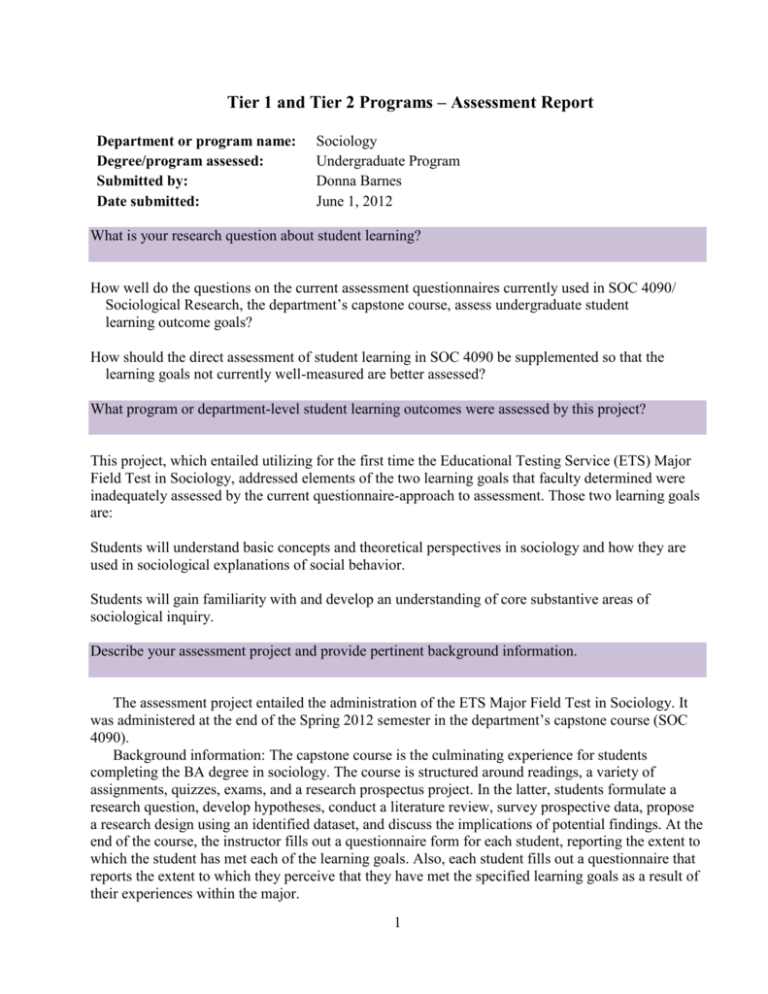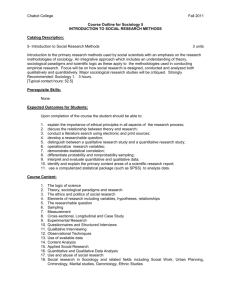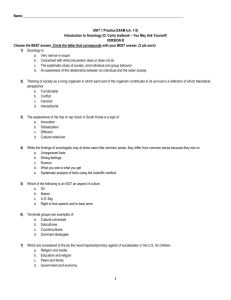Assessment Report
advertisement

Tier 1 and Tier 2 Programs – Assessment Report Department or program name: Degree/program assessed: Submitted by: Date submitted: Sociology Undergraduate Program Donna Barnes June 1, 2012 What is your research question about student learning? How well do the questions on the current assessment questionnaires currently used in SOC 4090/ Sociological Research, the department’s capstone course, assess undergraduate student learning outcome goals? How should the direct assessment of student learning in SOC 4090 be supplemented so that the learning goals not currently well-measured are better assessed? What program or department-level student learning outcomes were assessed by this project? This project, which entailed utilizing for the first time the Educational Testing Service (ETS) Major Field Test in Sociology, addressed elements of the two learning goals that faculty determined were inadequately assessed by the current questionnaire-approach to assessment. Those two learning goals are: Students will understand basic concepts and theoretical perspectives in sociology and how they are used in sociological explanations of social behavior. Students will gain familiarity with and develop an understanding of core substantive areas of sociological inquiry. Describe your assessment project and provide pertinent background information. The assessment project entailed the administration of the ETS Major Field Test in Sociology. It was administered at the end of the Spring 2012 semester in the department’s capstone course (SOC 4090). Background information: The capstone course is the culminating experience for students completing the BA degree in sociology. The course is structured around readings, a variety of assignments, quizzes, exams, and a research prospectus project. In the latter, students formulate a research question, develop hypotheses, conduct a literature review, survey prospective data, propose a research design using an identified dataset, and discuss the implications of potential findings. At the end of the course, the instructor fills out a questionnaire form for each student, reporting the extent to which the student has met each of the learning goals. Also, each student fills out a questionnaire that reports the extent to which they perceive that they have met the specified learning goals as a result of their experiences within the major. 1 Based on faculty discussions about the assessment process, faculty concurred that the current assessment approach allows the department to assess properly two of its student learning outcome goals. Those two goals, and the means by which they are assessed, are: Students will understand how to collect, analyze, and interpret empirical evidence in sociological research (the “Methods” goal). Students complete fifteen in-class quizzes over material related to research methods. There are also lab exercises and in-class exams. These eclectic requirements allow the instructor to assess, and report on a questionnaire form (see Appendix, Attachment A), the extent to which each student understands the various steps of the research process. For indirect assessment, the students are given an opportunity to reflect on the extent to which they perceive that they have met this learning goal as a result of the assignments in SOC 4090 and their other courses in the curriculum (see Appendix, Attachment B). Students will be able to express sociological ideas clearly and coherently both in writing and oral presentations (the “Clarity in Communication” goal) Both individually and in teams, students give presentations on two articles assigned as readings in SOC 4090. Students also create research folders in which they compile all written materials related to their research prospectus, such as a topic proposal, an annotated bibliography, a data report, a prospectus outline, a literature review, and a first draft of their research prospectus. They receive written feedback and concrete suggestions for revising each component of their project. In the final week of the semester, students give an oral presentation on their research prospectus project. The oral presentations and the extensive writing assignments allow the instructor to assess, and report on a questionnaire form (Appendix, Attachment A), the ability of the students to express sociological ideas orally and in writing. For indirect assessment, the students are asked to reflect on the extent to which they believe that they have honed their skill in expressing sociological ideas in writing and orally (Appendix, Attachment B). As a result of their discussions of assessment, however, faculty decided that two of the department’s four student learning goals remained inadequately measured: Students will understand basic concepts and theoretical perspectives in sociology and how they are used in sociological explanations of social behavior (the “Concepts and Theory” goal) Students will gain familiarity with and develop an understanding of core substantive areas of sociological inquiry (“the Core knowledge” goal). Unavoidably, there are important concepts and theoretical perspectives in sociology, as well as core substantive areas of sociological inquiry, that are not covered in SOC 4090 because of time constraints and the need to focus the course primarily on the process of collecting, analyzing, and interpreting empirical evidence in sociological research. Furthermore, the faculty struggled with how to address the challenge of assessing the “Core Knowledge” learning goal. Sociology is a very broad discipline with many different core substantive areas. The department recognized this breadth when it structured the requirements of the major. It created a core curriculum that granted students flexibility 2 in choosing which courses they would take to fulfill core requirements. The core curriculum has five major areas of knowledge: Society and Inequality; Social Organization & Processes; Social Institutions; Individual and Society; and Global Comparative Sociology. Each major must take at least one course from four of these five areas of knowledge and then supplement those course selections with nine hours of sociology electives of their choice (see Appendix, Attachment C). The flexibility of the sociology major has the major advantage of allowing students to follow their interests and to select courses that best fit their post-graduate career plans. However, the flexibility creates a major challenge when it comes to assessment: How can we assess our majors’ understanding of the concepts, perspectives, and core knowledge within the discipline, given that 60 percent of the credit hours required for the major are a result of the unique course selection decisions of our majors? After extensive discussion, the department decided to assess its majors’ understanding of concepts, perspectives, and core knowledge within the discipline by administering the Educational Testing Service (ETS) Major Field Test in Sociology. This test can be administered online, consists of 140 questions and runs two hours. It is designed to measure critical knowledge and understanding in the broad field of sociology. Test results provide objective data that will allow the department to assess student learning more thoroughly. The results also provide national comparative data on the extent of discipline-specific knowledge among UW sociology majors compared to sociology majors at almost 160 other colleges. Provide relevant data to answer your research question. What are the key findings? As a result of administering the ETS Major Field Test, the department discovered that its majors do exceptionally well when compared to sociology students at the other colleges who administer the Field Test. In terms of total score, our students ranked in the top 92nd percentile. This is a clear indication that our majors are being exposed to and are learning well the concepts, perspectives, and core knowledge within the discipline. In terms of the individual test scores, almost 45 percent (8) of our majors who took the exam scored in the 90th percentile, about 17 percent (3) scored between the 83rd and 86th percentile, and about 20 percent (4) scored between the 67th and 75th percentile. Unfortunately, about 17% did very poorly (31 percentile or lower); however, these were students who have struggled in the major, earning mediocre grades and occasionally having to repeat sociology courses in which they earned a D or F. So their poor performance was not a surprise and confirmed the ability of the Major Field Test to differentiate between our weaker and stronger majors. Another major finding was that performance data from the Major Field Test confirmed the faculty’s belief that students who had not yet taken Sociological Theory (SOC 3900) would not score as well on the test as those who had successfully completed that course. Consistent with this belief, all of the students who scored in the 90th percentile or higher had successfully completed Sociological Theory. One final observation about the Major Field Test data is that one of the students who took the test was a social science major, rather than sociology major. Despite this student having an undergraduate GPA of 3.5, she only performed in the 70th percentile on the test; two-thirds of the sociology majors scored higher. The contrast between her strong GPA and mediocre performance on the Major Field Test suggests that the performance of our majors on the test was enhanced by their having met the course requirements of the sociology major. 3 Describe the meaning of your results as they relate to program strengths and challenges. What changes to the program or curriculum have been made, are planned, or contemplated in the future as a result of this assessment project? The department will continue to use its learning-outcome questionnaires to assess the extent to which students are achieving its learning outcome goals, particularly the “Methods” and “Clarity in Communication” goals. However, the Major Field Test in Sociology is much better-suited to assess the “Concepts and Theory” and “Core Knowledge” learning goals, given that it poses questions about theory, as well as eight other core areas within the discipline of sociology. Data from the first administration of the Major Field Test have increased the faculty’s confidence that the structure of the sociology major, which was revamped about five years ago, is serving our majors well. The 92nd percentile ranking of the aggregate score of all of our students who took the test is a source of pride. Importantly, the data have also significantly reduced concern about whether the requirements of the major had a proper mix between required course work and flexibility in course selection. The results of the Major Field Test have significantly alleviated concerns that the current level of flexibility in the selection of sociology courses by our majors might undercut the development of a core set of knowledge or skills. The data from the Major Field Test have already yielded one change to the curriculum: Given that all of the students who scored in the 90th percentile or higher on the ETS Major Field Test in Sociology had successfully completed Sociological Theory (with a C or better), the faculty voted to make the theory course a prerequisite for SOC 4090/Sociological Research. In a broad discipline such as sociology, assessing core knowledge and understanding of concepts and perspectives can be difficult. However, we want our majors to have a common “tool kit” and skill set upon graduation and are committed to using our curriculum to teach appropriate skills and knowledge to our majors. The ETS Major Field Test in Sociology will remain an integral part of our direct assessment approach to determining the extent to which our commitment is reaping positive results. 4









